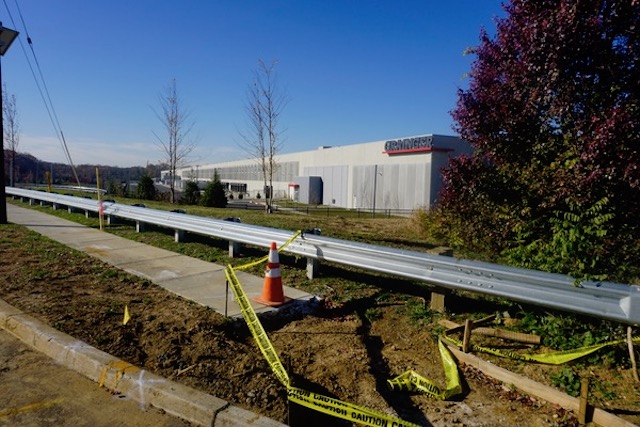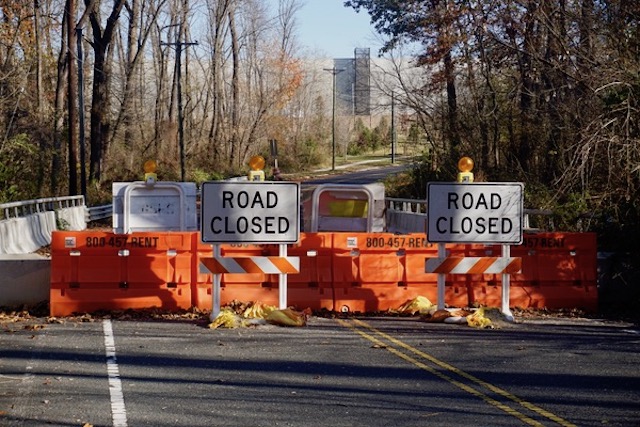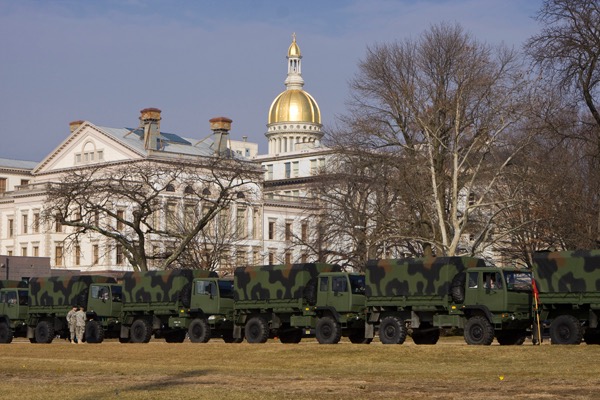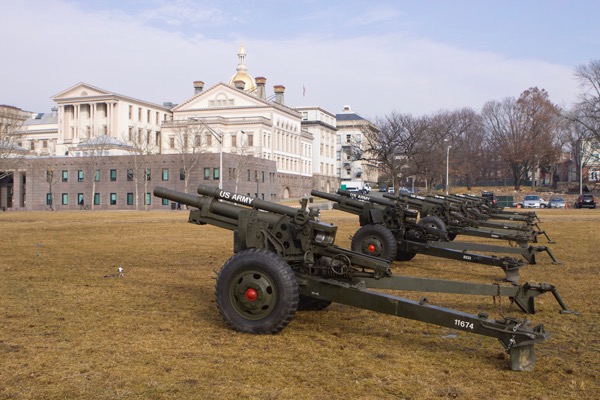Denial and Delusion In TrumpWorld
Gore Grovels
False Hope, Naivete’, Careerism, and Cowardice In High Places
[Updates below]
A quick note today on denial and delusions –
No, not the well documented delusions of Donald Trump – but rather the delusions of Al Gore and whatever “environmental activists” Coral Davenport of the NY Times was referring to in this absurd headline:
The media’s pack coverage of the Gore/Trump meeting is just more of the same “horrid coverage” of the climate change issue (Counterpunch):
– The horrid “coverage” of global warming and climate change in the U.S. media, which has consistently embraced the false claims of fossil-fuel funded think tanks and pundits claiming that the planet is not warming, and if it is, that it is due merely to natural fluctuations in temperature over time. This position, if one could even call it that, is rejected by virtually every climatologist on the planet, and is nothing more than blatant propaganda in service of the fossil fuel industry and their useful idiots in Congress (and now the White House), who are dead set on dramatically escalating the threat of global warming. As more societal attention has been directed as of late to the scientific consensus that global warming is real, almost entirely caused by humans, and a serious threat to ecosystems, species, and possibly even human survival, corporate media have sought to obscure this reality at every turn. Media outlets like Media Matters for America should be commended for documenting the journalistic efforts to downplay climate change, as seen in the overwhelming majority of media weather reports on forest fires, coastal flooding, and heat waves which simply refuse to situate these extreme weather events within the broader context of climate change, despite numerous scientific studies concluding that extreme weather becomes more probable with global warming.
Did Al Gore think that a Ted Talk to The Donald would change his mind or alter the politics on climate? That he could use Ivanka Trump to manipulate him? That he could derail the Trump Transition juggernaut, overcome corporate expectations and lobbyists, and derail the massive political momentum of Trump’s climate denying base and campaign commitments?
Gore symbolically crawled on his belly to Trump Tower to kiss the King’s ring. What a tool.
Worse, Gore did so at a critical time when he should be standing with Standing Rock and calling for rebellion and organized resistance to the Trump agenda.
In that regard, Gore follows and serves the same symbolic and political purposes as Obama’s White House meeting, which served to legitimize and normalize Trump. Obama’s trip to Europe (Greece and Germany) was designed to do the same thing, e.g. to assure allies and world financial markets that Trump’s remarks about NATO would not undermine “continuity” in US foreign policy. (Ironically, scaling back NATO and US imperial hegemony and trade agreements were about the only sane things Trump said. Leave it to Obama to nix all that – just like his “look forward, not back” policy let the Bush War Criminals off the hook and institutionalized and provided “continuity” with much of the Bush wars, Wall Street bailout, and post 9/11 National Security State. Trump can be viewed as the bookend of Obama’s Bush Neoliberal consolidation.)
Similarly, as I’ve previously noted, new Democratic Senate Minority Leader Chuck Schumer raised the white flag almost immediately.
While the NY Times has found historical resonance in the fact that Gore – like Hillary Clinton – won the popular vote, it’s also worth recalling that, historically, Gore played exactly the same craven role in the Bill Clinton Administration’s politics of concession and appeasement in response to the “Gingrich Revolution” and the Republican Congress’ “Contract for America”. (Just call me Al, Democratic envoy to the corporate Right wingnuts.)
That was the political impetus for the Clinton Administration’s “Reinventing Government” initiative.
Policy Wonks may recall that initiative created a “partnership” with States that reflected right wing Federalist Society views. It promoted market tools and basically gutted the federal role in supervising State implementation of federal laws, like the Clean Air Act, Clean Water Act, RCRA, etc. and dramatically weakened the enforcement of environmental laws.
But I am getting far too deep in the policy weeds – back to Gore’s Trump meeting.
Gore’s delusions about Trump are echoed in the environmental community and media punditry.
Repeating major mistakes of the campaign coverage, the media seems to be walking on eggshells in failing to accurately characterize the reckless and radical nature of the Trump regime.
Meanwhile, the response from the beltway environmentalists seems muted, cowardly, and in disarray.
Not only do media and environmentalists underestimate the radicalism of Trump, they exaggerate the capacity of “checks and balances” to soften or moderate Trump.
I’ve heard multiple excuses and forms of denial, which reveal not only naivete’, but a complete lack of understanding of executive power, including:
- “It’s too early, he hasn’t done anything. We need to give him the benefit of the doubt and try to work with him on issues of common concern (e.g. jobs, infrastructure, trade).”
- “He won the election and should be given a chance to govern.”
- “Trump has backtracked on many of his extreme campaign statements – maybe if we are nice to him, he won’t follow through or change his mind on the radical climate and environmental rollbacks. Don’t criticize and get him mad, because he is thin skinned and vindictive and we will surely lose.”
- “Congress, the Courts, whistleblowers, and the media will expose, check and prevent abuses.”
- “The Generals (or the bureaucrats) will not follow illegal orders.
- “We can play defense for 4 years and then resume progress in 2020.” (I actually heard this on NPR WHYY Philadelphia from a climate reporter who claimed that climate activists in Marrakech expressed hope and confidence in the wake of Trump’s election).
- “The wheels of government turn slowly and career bureaucrats are sure to resist Trump’s Agenda. So we’ll have time to convince the American People to rise up and block the worst of Trump’s agenda.”
- “The environmental groups can use lawsuits to block Trump’s EPA rollbacks.”
- “Environmentalists should refocus and redouble efforts at the State and Local level.” [Deft move, after 7 years of giving NJ Gov. Christie a pass.]
- “Free market forces (low natural gas prices, declining solar costs, etc) will produce as much GHG emissions reductions as EPA regulations so it really doesn’t matter, Trump can’t change the direction of the market towards lower emissions.”
In a future post, I will explain why each of these assumptions is delusional.
For now, just consider the massive destruction Trump plans in his “Day One” initiative.
As I’ve written, that first day “go large” with Executive power strategy mimics NJ Gov. Chris Christie’s first day in Office.
Where do you think Trump got his “Day One” idea from?
[Update – 12/8/16 – I need to make a few points on delusions in NJ Spotlights’s coverage of Trump’s EPA pick:
1. The headline gives him the benefit of the doubt (“could be bad news” versus “would be”)
2. The NJ ENGO’s adopted the delusion I mentioned above, i.e. focus on State issues. Not only is that delusional with respect to Trump and his EPA head – climate change effects us all. We can not escape the damage that Trump/Pruitt will do on the energy and climate front – but it is self serving and cynical.
NJ LCV gets paid (grant funded) to endorse Democrats. They are pimping off the Trump debacle to attempt to be a policy player in Trenton. The same cynical partisan politics can be seen in NJ LCV (and others’) support of the NRD Constitutional amendment ballot question SCR 39, which is designed to increase voter turnout in a gubernatorial election year and benefit the Democratic candidate for Governor.
As I’ve written, they are getting played – what use would it be to have NJ voters go through a Constitutional charade to dedicate money from a DEP NRD program that is not generating any revenues or recovering just pennies on the dollar?
3. This was my favorite quote in the Spotlight article – and it goes to exactly the history I wrote about above: (boldface mine)
“Pruitt has been a vocal critic of federal overreach and understands that state agencies are well-positioned to take on a larger role in protecting the environment, while also allowing for responsible and necessary commerce and energy production,’’ said John Nothdurft, director of governmental relations for The Heartland Institute, a conservative think tank based in Illinois.
The origin of the “federal over-reach” attack on EPA was Newt Gingrich and the Contract on America (1994). Those attacks were led by the fledgling Federalist Society.
The Clinton Administration, in a classic “triangulation” move, compromised with Gingrich and incorporated a radical State’s rights “federalism” in their “Reinventing Government” initiative. Under the banner of the “partnership” slogan, it crippled strict EPA oversight of State enforcement of environmental laws and weakened implementation of environmental laws across the board.
That Clinton compromise was led by none other that Al Gore.
Gore just signaled the same craven compromise in his meeting this week with Trump on climate.
History repeats itself.
[Update #2 – The NY Times does not share NJ Spotlight’s timidity or headline ambivalence –
- Trump Picks Scott Pruitt, Climate Change Denialist, to Lead E.P.A.
Relevant highlights from the NY Times coverage:
Mr. Pruitt may be the right man to do that. As attorney general, Mr. Pruitt created a “federalism unit” in his office, explicitly designed to fight President Obama’s health care law and environmental regulations.
“You could see from him an increasing effort to delegate environmental regulations away from the federal government and towards the states,” said Ronald Keith Gaddie, a professor of political science at the University of Oklahoma. …
As Mr. Pruitt has sought to use legal tools to fight environmental regulations on the oil and gas companies that are a major part of his state’s economy, he has also worked with those companies. A 2014 investigation by The Times found that energy lobbyists drafted letters for Mr. Pruitt to send, on state stationery, to the E.P.A., the Interior Department, the Office of Management and Budget and even President Obama, outlining the economic hardship of the environmental rules.
NJ Gov. Christie was part of the State attack on Obama EPA Clean Power Plan rules and shares much of the Pruitt anti-regulatory ideology and slogans (command and control, one size fits all, job killing red tape, etc), but I don’t think he went this far down the fraud road:
Mr. Pruitt’s office also began to send letters to federal regulators — including the E.P.A. and even President Obama — that documents obtained through open records requests show were written by energy industry lobbyists from companies including Devon Energy. Mr. Pruitt’s staff put these ghostwritten letters on state government stationery and then sent them to Washington, moves that the companies often then praised in their own news releases, without noting that they had actually drafted the letters in the first place.
But I could be wrong.
[Update #3 – Washington Post notes ideology and quoted Trump doubling down:
Pruitt has spent much of his energy as attorney general fighting the very agency he is being nominated to lead.
He is the third of Trump’s nominees who have key philosophical differences with the missions of the agencies they have been tapped to run. …
“For too long, the Environmental Protection Agency has spent taxpayer dollars on an out-of-control anti-energy agenda that has destroyed millions of jobs, while also undermining our incredible farmers and many other businesses and industries at every turn,” the release quoted Trump as saying. He said Pruitt “will reverse this trend and restore the EPA’s essential mission of keeping our air and our water clean and safe.” Trump added, “My administration “strongly believes in environmental protection, and Scott Pruitt will be a powerful advocate for that mission while promoting jobs, safety and opportunity.”
WaPo also notes the federalism issue, but provides no history or context:
After he was elected attorney general in 2010, Pruitt established a “Federalism Unit” to “more effectively combat unwarranted regulation and systematic overreach by federal agencies, boards and offices,” according to his online biography.
To their credit, they do note industry support:
Industry representatives expressed satisfaction with the choice Wednesday. “The office he headed was present and accounted for in the battle to keep EPA faithful to its statutory authority and respectful of the role of the states in our system of cooperative federalism,” said Scott Segal, head of the policy group at the lobbying and legal firm Bracewell. …
“General Pruitt has been the leader among the AGs in defending federalism, the key feature of our constitutional architecture,” said Rivkin, a partner at Baker Hostetler, adding that he believed Pruitt would “ensure both environmental protection and constitutional fidelity.”
[Update: 2/10/17 – vindicated again – I get tired of “I told you so”. Krugman today:
We’re only three weeks into the Trump administration, but it’s already clear that any hopes that Mr. Trump and those around him would be even slightly ennobled by the responsibilities of office were foolish.
[Update – 12/16/16 – SCR39, to dedicate NRD money discussed below, was amended to increase the cap to 10% and include a local nexus requirement. Those are good amendments we and others requested and I now support the Resolution and obviously the criticism of NJ LCV et al must no longer hold on the NRD issue. ~~~ end update]









